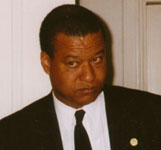Old Wine In New Bottles: $1.2
Million Dollars For Taylor & Urey
(LDF Commentary)
July/Sept 1997
Like most Liberians, we at the Liberian Democratic Future -
publisher of The Perspective, had hoped for Liberia's new president
to have been someone other than a ruthless former warlord. But
like most people, we were surprised by the result of the recent
elections which brought Mr. Taylor to power. Now our fear and
apprehension are becoming a bitter reality. From the way events
are unfolding in Liberia, it appears our ugly past which we thought
would have become history is surging and it seems like old wine
in new bottle, and corrupt business as usual.
The question that is paramount on most people's mind is: Will
Taylor make good on his promises? The answer to this tantalizing
question is now emerging. And from all indications, a pattern
is being established - a disturbing pattern nevertheless. You
be the judge.
On August 14, 1997, twelve days after Mr. Taylor was inaugurated
president, he issued Executive Order #1 to the president of the
International Trust Company (ITC), a U. S. based corporation that
manages the Liberian shipping registry. Based on this order, the
president of ITC was instructed to  place
10% of the Maritime revenues into the personal account of Mr.
Benoni Urey, Commissioner of the Bureau of Maritime Affairs. This
was a classified information never intended for the public. As
a result, Mr. Urey did not refer to it when he outlined his bureau's
plans before the legislature.
place
10% of the Maritime revenues into the personal account of Mr.
Benoni Urey, Commissioner of the Bureau of Maritime Affairs. This
was a classified information never intended for the public. As
a result, Mr. Urey did not refer to it when he outlined his bureau's
plans before the legislature.
According to reliable sources, Mr. Urey is "not the brightest
of Taylor's die-hard loyalists, (but) he is very close to Mr.
Taylor and works pretty fast." Ten percent of the Maritime
fund amounts to $1.2 million (U. S.) annually. Our sources further
noted "It is not a good signal of how the government intends
to conduct its fiscal affairs."
It is reported that President Taylor was not pleased when certain
foreign officials cautioned that "the Maritime Bureau needed
to keep in mind that the success of the registry depended on Liberia's
ability to keep its customers - the ship owners happy. Open criticism
of ITC by the bureau and its efforts to strip ITC of responsibility
for providing related services were causing concern."
In addressing this concern, Mr. Taylor said "the issue
was more complicated than that. The Maritime program was originally
set up as a security arrangement that would serve both governments'
interests. The president of ITC parent company had set himself
between the two governments and was the source of all friction.
There should be no question about who's the boss," Mr. Taylor
emphasized.
Throughout his discussion with foreign officials, President
Taylor shrewdly avoided the 10% set aside he had ordered ITC to
place in Benoni Urey's personal account at "a reputable bank."
Instead, he shifted the issue to some audit that ITC refused to
conduct.
This reminds us of the argument advanced in the May 1996 edition
of Current History (A Journal of Contemporary World Affairs) by
William Reno. In the article entitled "The Business of War
in Liberia," Reno stated that the key to sustaining the Liberian
civil wasr has been Taylor's skill at controlling and cultivating
sources of foreign exchange; this has allowed him to arm his soldiers
and conquer areas with easily exploitable resources. Taylor first
turned to foreign firms with operations in Liberia. The advantage
of this strategy was that it freed him from reliance on bureaucracies.
As a wayward client of the former president (Doe) Taylor recognized
that bureaucracies are especially dangerous, since enterprising
directors can use them to build their own power bases."
This argument explains Taylor's action in transferring a slice
of the pie to his confidant's personal account. Remember the bureau
for the eradication of corruption? Rampant corruption? The more
things change, the more they remain the same. In Liberia, it's
old wine in new bottle!.
 place
10% of the Maritime revenues into the personal account of Mr.
Benoni Urey, Commissioner of the Bureau of Maritime Affairs. This
was a classified information never intended for the public. As
a result, Mr. Urey did not refer to it when he outlined his bureau's
plans before the legislature.
place
10% of the Maritime revenues into the personal account of Mr.
Benoni Urey, Commissioner of the Bureau of Maritime Affairs. This
was a classified information never intended for the public. As
a result, Mr. Urey did not refer to it when he outlined his bureau's
plans before the legislature.